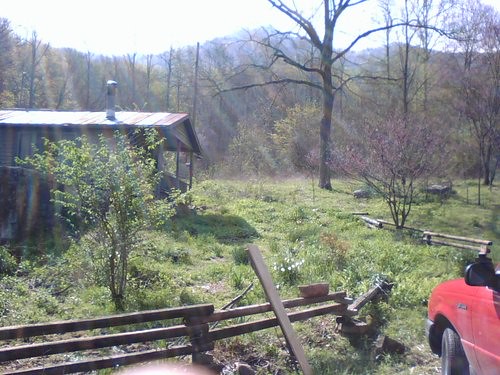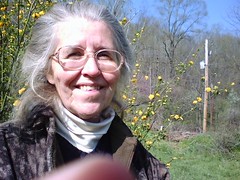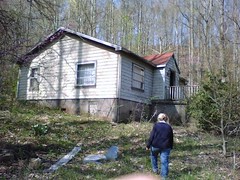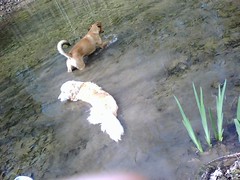Sense of Place: Ravenkeeper’s Playwrights’ Retreat
Greta Fields’ neighbors over the ridge are strip mining. Greta is planting wildflowers. The contrast is palpable as Greta tells me of pressure from the mining company to sell her land. Greta has other plans.

“I thought of calling this place Mine Pony Farm, to honor all the ponies who lived here and died in the mines,” she muses between pointing out and naming bunches of flowering plants in the understory. We walk in and out of woods on her land, a mountain, actually, in Appalachia. She was raised in these mountains and is clearly as rooted and natural here as the flowers and fruit trees she’s sown.
 Her family has a rich love of the theater and Greta has authored several plays. Her ties to the regional and national arts communities lead to the brainstorm of turning her farm into a playwrights retreat, complete with homes for writers and actors and a stage, where playwrights can hear their works in progress performed.
Her family has a rich love of the theater and Greta has authored several plays. Her ties to the regional and national arts communities lead to the brainstorm of turning her farm into a playwrights retreat, complete with homes for writers and actors and a stage, where playwrights can hear their works in progress performed.
She’s well on her way. Many fledgling groups struggle to find and purchase land. Greta has plenty of land, owned outright, and she’s researching putting it in land trust. Often getting the first houses on the land is an ordeal. Her farm has 4 homes and a trailer now. The single story homes range from one to three bedrooms, with complete kitchens and baths. All have been rewired. At the moment, all need some repairs. She used to maintain them herself, but she’s been away from the property attending graduate school and now she’d like to hire or trade with a handyperson or caretaker who will occupy the farm during the work.
 Greta has a biocentric (life centered) philosophy and she protects and nurtures a population of rare, large ravens on her land, hence her online moniker, Ravenkeeper.
Greta has a biocentric (life centered) philosophy and she protects and nurtures a population of rare, large ravens on her land, hence her online moniker, Ravenkeeper.
I’m excited at the possibility of preserving Greta’s farm in land trust, protecting it from unsustainable practices and holding it instead as a platform for exploring and preserving the rich cultural and arts traditions of Appalachia. “ I used to think the idea of ‘Appalachian place’ was meaningless,” explains Greta, “Now I realize it is everything. If you lose your sense of place, you lose your soul.”
 Few words could be more powerful for me, as I visit Greta directly from visiting my family farm in Bloomfield, Kentucky. Our farm as been in our family since the land grant days. It has always been a touchstone for me, a living soul I sometimes call my “second grandmother.” I wrote my screenplay, Bacca Blooms, as an exploration of my bond with our farm and the generations of my bloodline there.
Few words could be more powerful for me, as I visit Greta directly from visiting my family farm in Bloomfield, Kentucky. Our farm as been in our family since the land grant days. It has always been a touchstone for me, a living soul I sometimes call my “second grandmother.” I wrote my screenplay, Bacca Blooms, as an exploration of my bond with our farm and the generations of my bloodline there.
As I approach 14 years of life in the woods of Heathcote Community, I ponder how mobile our society really is. During this trip I heard an NPR report that more than half of the human race is now living in urban settings. So few of us put down roots and sit still with any piece of land for very long. What are we denying ourselves? This loss must diminish us. No wonder so many humans can’t view their purchasing and lifestyle choices through the filter of their impacts on the environment. Their choices so rarely come directly back to them. And the land doesn’t get the time to “speak” to them, as when we slow down, getting still and wordless.

 Greta has many of the elements in place to make a difference on this piece of land, and to offer it as a sanctuary to artists who might then spread their “sense of place” to the world. Who can help her with the next step, which is getting her houses ready for artists? The caretaker should have carpentry, plumbing and electrical skills and be able to work independently with direction. And s/he should be prepared for rustic living, these are the mountains. There are snakes, bobcats and bears. Nature is not a Disney movie!
Greta has many of the elements in place to make a difference on this piece of land, and to offer it as a sanctuary to artists who might then spread their “sense of place” to the world. Who can help her with the next step, which is getting her houses ready for artists? The caretaker should have carpentry, plumbing and electrical skills and be able to work independently with direction. And s/he should be prepared for rustic living, these are the mountains. There are snakes, bobcats and bears. Nature is not a Disney movie!
 If you’re interested in being a caretaker or getting involved with Greta’s farm in another way, contact her via her gaia.com profile.
If you’re interested in being a caretaker or getting involved with Greta’s farm in another way, contact her via her gaia.com profile.
If you’d like to find an Intentional Community near you, or just learn more about it, join our gaia group.
Join our Hippie Chick Diaries fanpage on facebook!
Subscribe to this blog's RSS feed
